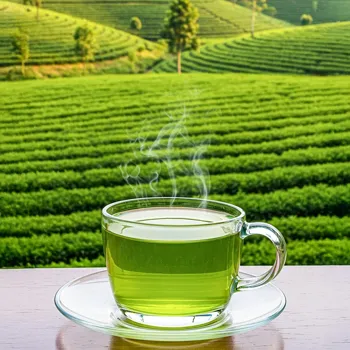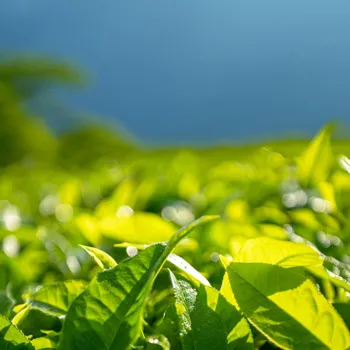Unveiling Green Tea: Elixir of Youth or Just a Fad? Delve into its health benefits, myths, and brewing tips. Join the journey!
For ages, people across India have sought the elusive fountain of youth. While
a single magic potion remains the stuff of legends, could a humble beverage, readily available in our local kirana stores, hold the key to a longer, healthier life? We're talking about green tea, of course.
This centuries-old drink, deeply ingrained in Asian cultures, is now creating a buzz in India, with many swearing by its supposed health benefits. But is the hype justified, or is it just another fleeting health fad?
Let's delve into the science and discover whether green tea truly lives up to its reputation as an elixir of life.
Green tea's rich history and medicinal properties
Green tea boasts a rich history, particularly in countries like China and Japan, where it's been consumed for centuries, not just for its flavour but also for its medicinal properties. Traditional medicine systems often prescribed it for various ailments, from headaches to digestive issues.
The preparation of green tea itself is an art form, with variations in steaming methods and brewing techniques affecting its taste and potency. It has certainly earned its place in society and it is also a part of the tea culture.
Green tea's antioxidants combat free radicals, benefiting health
One of the primary reasons behind green tea's purported health benefits lies in its abundance of antioxidants, particularly catechins. These powerful compounds act as scavengers, neutralizing harmful free radicals in the body, which are known to contribute to aging and various diseases.

Think of them as tiny bodyguards, protecting your cells from damage. This is a significant fact that makes the tea a great drink.
Green tea shows promise for heart health benefits
Many studies have explored the impact of green tea on heart health, with promising results. Some research suggests that it can help lower bad cholesterol levels, improve blood vessel function, and reduce the risk of heart attacks and strokes.
While more research is always needed, the existing evidence paints a compelling picture of green tea as a potential ally in maintaining a healthy cardiovascular system. So why not have an extra cup and let green tea do wonders!
Green tea boosts brain health with L-theanine
The benefits of green tea could extend to brain health as well. Some studies indicate that it can improve cognitive function, enhance memory, and protect against age-related neurodegenerative diseases like Alzheimer's and Parkinson's.

The presence of L-theanine, an amino acid, adds another layer to its brain-boosting properties, promoting relaxation and focus without the jitters often associated with caffeine. Green tea can be a delicious way to ensure a healthy body and mind.
Green tea may aid in cancer prevention, but more research is needed
Emerging research even points towards green tea's potential role in cancer prevention. While it's certainly not a cure, some studies suggest that its antioxidants may help inhibit the growth of cancer cells and reduce the risk of certain types of cancer, including breast, prostate, and colon cancer.

However, it's important to note that more research is needed to fully understand the extent of its anti-cancer effects.
Green tea gaining popularity in India as healthier chai alternative
India, with its rich history of herbal remedies and Ayurvedic practices, is no stranger to the concept of natural healing. Green tea is slowly but surely finding its place in Indian households, with many people adopting it as a healthier alternative to traditional chai.
The Indian market is now flooded with various brands and flavours of green tea, catering to diverse tastes and preferences. From classic plain green tea to blends infused with tulsi, ginger, or lemon, there's a green tea variety for every palate.
While previously black tea was a common preference, Green tea is the go to tea now.
Proper brewing of green tea is key for maximum benefits
To reap the maximum benefits of green tea, proper brewing is essential. Avoid using boiling water, as it can scorch the leaves and result in a bitter taste. Instead, opt for water that's around 80-85°C (175-185°F).

Steep the tea leaves for 2-3 minutes, and avoid over-steeping, which can also lead to bitterness. Experiment with different types of green tea and find the one that suits your taste buds the best. Loose leaf tea generally offers a better flavour profile compared to tea bags.
It is important to brew it properly and make the right choice.
Creative ways to enjoy green tea benefits in diet and beauty
While drinking green tea is the most common way to enjoy its benefits, there are other creative ways to incorporate it into your diet and beauty routine. Green tea extract is often added to smoothies, juices, and even baked goods.
Green tea-infused skincare products are also gaining popularity, thanks to its antioxidant and anti-inflammatory properties. Consider incorporating it to your routine and experience the magic!
Green tea offers health benefits but moderation is key
So, is green tea the secret to longevity? While it's certainly not a magic bullet, the evidence suggests that it offers a wide range of health benefits, from boosting heart health and brain function to potentially preventing cancer.

When coupled with a healthy lifestyle, including a balanced diet and regular exercise, green tea can be a valuable addition to your wellness routine. However, it's important to remember that moderation is key.
Consuming excessive amounts of green tea can lead to side effects like caffeine jitters or digestive issues.
Green tea's benefits and cautions for specific health conditions
We spoke to Dr. Priya Sharma, a leading nutritionist in Delhi, about the rising popularity of green tea. "Green tea is indeed a powerhouse of antioxidants and offers numerous health benefits, as validated by various studies," she says.
"However, it's crucial to remember that it's not a substitute for a healthy lifestyle. It should be consumed as part of a balanced diet and regular exercise regimen for optimal results.
" She also cautioned individuals with specific health conditions to consult their doctor before incorporating green tea into their diet. "People with anaemia, for instance, should be mindful of the fact that green tea can interfere with iron absorption."
Green tea isn't a weight-loss miracle; exercise and diet are essential
With the growing popularity of green tea, it's important to separate fact from fiction. One common myth is that green tea is a weight-loss miracle. While it can help boost metabolism and promote fat burning, it's not a standalone solution for weight loss.

Regular exercise and a calorie-controlled diet are still essential for achieving sustainable weight loss. Also, avoid adding sugar or honey to your green tea, as it can negate its health benefits. Another misconception is that all green tea is created equal.
The quality and potency of green tea can vary depending on factors like the type of tea leaves, brewing method, and processing techniques.
Green tea research reveals health benefits and applications
As research on green tea continues, we can expect to see more insights into its potential health benefits and applications. Scientists are exploring its role in preventing and treating various diseases, as well as its potential for enhancing cognitive function and promoting healthy aging.
With its growing popularity and promising research findings, green tea is poised to remain a prominent player in the world of health and wellness for years to come.
AI Generated Content. Glance/InMobi shall have no liability for the content












